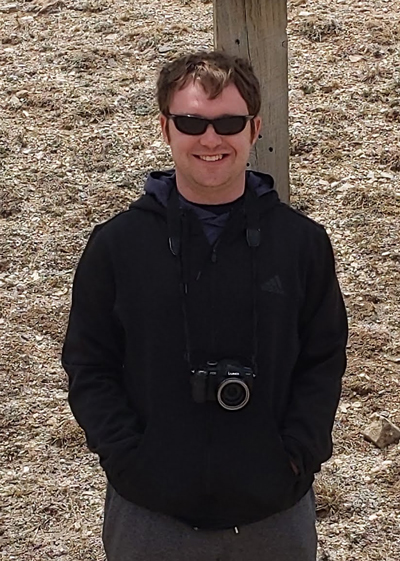What Our Students Are Saying...
 Kat Consola
Kat Consola
MA Candidate | University of Memphis
Department of Art | Art History
Concentration: Egyptian Art and Archaeology
The GIS certificate program at the University of Memphis is a wonderful option for graduate students like me. The brevity of the program allows me to finish it in time with my Master's degree (2 years), yet it is still academically challenging and thorough in scope. Having a GIS certificate under my belt will allow me more job opportunities upon graduation, since it is a versatile skill that is needed by many different types of jobs. Dr. Ozdenerol, who leads the program, has been a delightful and encouraging mentor for me and my peers.
 Rebecca Bingham
Rebecca Bingham
PhD Candidate | University of Memphis
Department of Earth Sciences
The GIS certificate has helped me in not only my Master program, but also my PhD.
As an undergraduate, I got started in learning about GIS. I began by determining home
range of ornate box turtles in South Dakota. Once I began my master program at the
University of Memphis, I knew I wanted to take my GIS skills to the next level. The
GIS certificate program did that and so much more. I started modeling habitat suitable
for the co-occurrence of two mesopredators: raccoon and Virginia opossum. The further
I got in the GIS certificate and the more classes I took, I became interested in higher
level GIS work. It motivated me to pursue my PhD in Earth Sciences and integrate what
I had learned in my undergraduate and master career into public health as well. I
am currently determining hot spots for Lyme disease incidence and trying to create
risk prediction maps. These maps will be used for wildlife vaccine deployment via
oral bait. From the research I have already conducted, I am also gaining collaborators
from other areas. I am also working on a project with a professor from Canada on morphologic
variations in Peromyscus maniculatis subspecies across North America. I would never
have had this opportunity if not for the GIS certificate program. I cannot express
the significance this program can play in your future. Whether preparing you for your
own research, helping others with theirs, or furthering your career. It is definitely
something worth pursuing.
What Our Alumni Are Saying...
 Jacob Saboly
Jacob Saboly
Armed with GIS skills, Jacob found an exciting opportunity to use GIS in climatology research. He created an app that allows users to explore the Tennessee historic tornado database and discover the areas of highest risk. He was awarded a scholarship and a research fellowship because of this work. He said "Taking the online GIS courses was a turning point in my college education, as I discovered a new passion and was introduced to new, exciting career possibilities. GIS is a subject that naturally works well with online education, and the online GIS courses at Memphis were both organized and flexible, exploiting the main strengths of online education.
Sylwia Bialas, St Jude Children’s Hospital
A Universal Degree: When asked about her position at St. Jude Children’s Hospital, Sylwia was most impressed by GIS certificate being a “universal degree” –a degree that had application in multiple areas. Her interests is on the spatial aspects of health and illness. For example: where are diseases found? how are diseases related to the environment? and where do people go to seek health care? Geographers use a variety of tools to study these topics such as maps, spatial statistics, and Geographic Information Systems (GIS). In a GIS, the data usually include attributes, or descriptive information. For example, you may have a data set of hospitals in the US that can be mapped. The descriptive data also allows you to search and display associated attributes (e.g., number of hospital beds, types of specialized services offered, etc). In terms of analysis, a GIS offers the opportunity to use spatial data to answer questions. For example: where are disease rates higher or lower? how far is it to the nearest healthcare facility? and where can we best locate a new syringe exchange location?
J ason Hodges, Director of Clinical Trials Management, Department of Hematology, St.
Jude Children’s Research Hospital
ason Hodges, Director of Clinical Trials Management, Department of Hematology, St.
Jude Children’s Research Hospital
The GIS certificate has opened so many doors and interesting opportunities for me. When I first began the program, I was working at the Shelby County Health Department. In that capacity, I was able to apply the knowledge I was gaining in the certificate program directly to community health projects in Memphis. I assisted in mapping proximity to healthy food options, mapping chronic disease mortality by zip codes, and targeting census tracts for various public health interventions. At St. Jude, I utilized GIS to understand the distribution of patients living with sickle cell disease in the Mid-South and then begin to query how place impacted disease severity, adherence, and healthcare utilization. The use of GIS in health research is an invaluable tool, particularly when examining ways in which the social determinants of health impact populations.
Miguel Rocha, Criminologist
A job that is diverse: Miguel and his team never stop looking for ways to improve the efficiency of GIS in criminology. He identifies his education, specifically a thorough knowledge of GIS/spatial concepts and a solid background in criminology, as what has allowed him to have a job that is varied, diverse, and, most important, never boring. GIS allows analysts to identify hot spots, along with other trends and patterns for crime mapping. GIS is also useful for law enforcement operations, such as allocating police officers and dispatching to emergencies.

